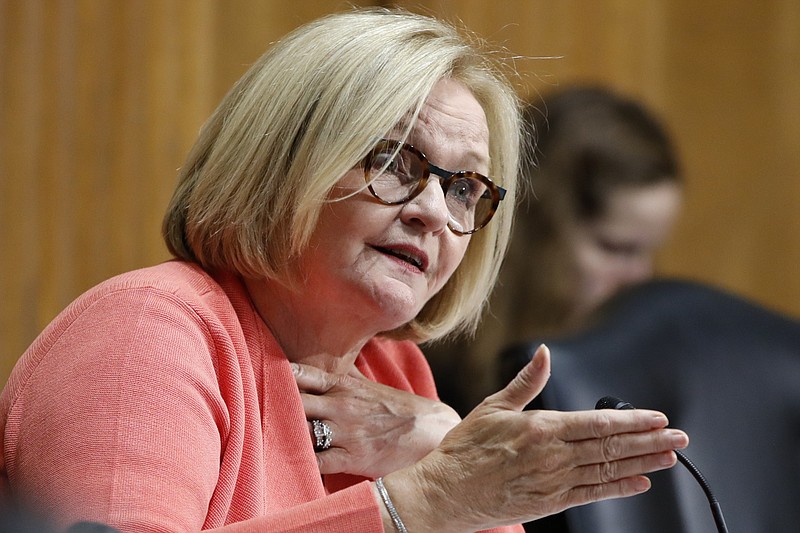U.S. Sen. Claire McCaskill on Tuesday urged the Trump Administration to re-evaluate its stance on tariffs as a way to level the playing field between foreign and U.S. companies.
McCaskill, a Democrat, sent a letter to U.S. Commerce Secretary Wilbur Ross, saying the Commerce Department's slow process of deciding which companies receive exemptions from U.S. steel and aluminum tariffs harms Missouri companies as they wait. The letter also details the experiences of 14 Missouri manufacturers, including two with Jefferson City factories, as costs of inputs increased because of U.S. steel and aluminum tariffs.
In March, President Donald Trump announced a 25 percent tariff on steel imports and a 10 percent tariff on aluminum. Those tariffs took effect fully at the beginning of June.
ABB makes electrical transformers at its Jefferson City factory and employs 775 people, according to the Jefferson City Area Chamber of Commerce. McCaskill's Tuesday letter states ABB imports electrical steel because electrical steel made by domestic manufacturers is hard to find. The letter states rising costs caused by the tariffs threaten ABB's facility in Jefferson City and 300 other Missourians the company employs.
"Both ABB (and St. Louis company Nidec) pay tariffs on the imported electrical steel they use in their U.S. operations," McCaskill's letter states. "A customer could easily buy a competing product from a foreign manufacturer and avoid the costs of the tariff completely."
ABB spokeswoman Melissa London did not respond to requests for comment before publication.
In June, Canada, Mexico and the European Union placed tariffs on long lists of U.S. goods in retaliation for the steel and aluminum tariffs. Unilever bottles hair care products, lotions and body wash at its Jefferson City factory. The company employs 510 people, according to the Jefferson City Area Chamber of Commerce.
McCaskill's letter said Canada's 10 percent tariffs on products made by Unilever threaten those jobs and 500 jobs at Unilever's Independence factory.
"Even in the consumer products industry there are thousands of Missourians caught in this global trade war," McCaskill's letter says.
A Unilever representative did not respond to the News Tribune's request for comment.
One of McCaskill's chief concerns with the tariffs lies with its exemption process. So far, the Commerce Department has approved 220 requests for exclusions from steel and aluminum users and denied 175 requests, according to CNBC.
McCaskill also worries about the effects the tariffs will have on the state's economy. Since the implementation of the steel and aluminum tariffs, a handful of companies in the Midwest began hiring. In June, U.S. Steel announced plans to reopen a second blast furnace and hire 300 workers at its Granite City, Illinois, plant because of demand caused by the tariffs. Before that, U.S. Steel reopened another furnace and created 500 jobs.
A handful of companies that use imported steel and aluminum also recently began laying off workers. In June, Mid Continent Steel and Wire in Poplar Bluff, the nation's largest manufacturer of construction nails, laid off 60 workers after tariffs on steel it uses caused the company to raise prices and caused sales to fall. A neighboring box company in Cape Girardeau later laid off four workers used to make boxes for Mid Continent.
Laclede Chain Manufacturing Co. in St. Louis laid off 25 employees in St. Louis after steel tariffs caused its input costs to rise by 25 percent, according to the Wall Street Journal.
Dan Mehan, Missouri Chamber of Commerce and Industry president, said July 6 that trade moves made so far threatened $881 million in Missouri exports. Despite the tariffs causing a handful of companies to experience turbulence, Mehan said Tuesday that economic leaders seem to be in a holding pattern to see what the long-term effects of the tariffs will be.
"Nothing has really changed," Mehan said. "The economy is still booming."
Last week McCaskill and U.S. Sen. Roy Blunt, a Republican, voted to approve a symbolic bill that instructed lawmakers working on a government funding bill to include language that gives Congress a role in tariffs implemented for national security reasons. The non-binding vote passed the Senate 88-11.
In a statement to the News Tribune, Blunt said Tuesday he thinks U.S. trade partners should live up to their obligations, but he has concerns about recent trade moves.
"I've met with President Trump and Secretary Ross and been very clear about my concerns with the tariffs on steel and aluminum," Blunt said. "Missouri manufacturers support hundreds of thousands of jobs and help drive growth in our state's economy."
In her letter to Ross, McCaskill said she understands the Trump Administration is trying to save U.S. steel and aluminum producers, but retaliatory tariffs imposed by other countries are endangering companies in other industries.
Republican Missouri Attorney General Josh Hawley, who is running for McCaskill's Senate seat, wants to see how the trade discussions play out, said Kelli Ford, a spokeswoman for Hawley's Senate campaign. Ford said Mid Continent applied for an exemption and Hawley spoke with the White House about their application.
"Attorney General Hawley supports the president's approach to get better trade deals and stop trade cheaters, like China, in order to put American workers and farmers first," Ford said.

